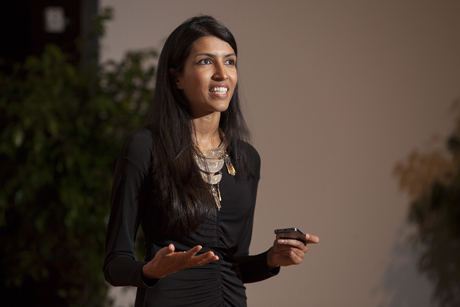CEO's firm connects the poor to tech jobs
By Hanna Zdrnja

“Let’s begin with the problem: lack of jobs,” said Leila Janah, CEO and founder of Samasource, an enterprise that promotes social justice by connecting people living in poverty to jobs via the Internet at the 2013 Iscol Family Program for Leadership Development in Public Service annual lecture on campus Sept. 30. “Work is at the core of human dignity.”
Janah said Samasource’s founding concept is to fight poverty by providing people with jobs in technology. She continued, “Whether you care about human rights, or peace and security, whether you care about infant mortality, sex trafficking or food security, what is at the root of many of the challenges in these sectors is lack of access to work.”
Samasource provides access to work through a model called “microwork.” It breaks down big projects for Silicon Valley companies like Google, LinkedIn and Walmart.com into small, manageable tasks that people in India, Kenya, Uganda or Haiti (where there are current Samasource centers) can complete with minimal training, thus creating a virtual assembly line.
For example, Samasource employees have worked on such projects as training algorithms to recognize whether parking spots were occupied or vacant, and tagging celebrity photographs for Getty Images. “Today, we don’t need all of that infrastructure because we can tap the greatest human resource around the world, which is the brainpower at the bottom of the pyramid,” Janah said.
Janah also talked about SamaUSA, a domestic company that helps low-income community college students master basic technology like setting up workspace pages to acquire more skills and earn better salaries. Another company, Samahope, creates a platform for crowd funding for neglected medical treatments.
Before launching Samasource in 2008, Janah created a family of social justice enterprises that could be as entrepreneurial and innovative as for-profit companies. She spent six months in Ghana after high school, where she saw that “despite people’s work ethic, they still remained poor.” She went on to earn a B.A. at Harvard University and worked as a management consultant at Katzenbach Partners and the World Bank.
Janah concluded her lecture with advice to Cornell students: “Becoming a social entrepreneur requires audacity. … Organizations that are founded by people who are deeply passionate are far more successful than those that are founded by people who are simply looking to make money.”
“I think that it was a creative idea to use technology,” said Madison Leonard, a freshman in the College of Agriculture and Life Sciences.
Said Harold Giwa-Amu, a senior psychology major in the College of Arts and Sciences, “I got the sense that social entrepreneurship can help other people and not just the entrepreneurs themselves. In the international development community, we need to be profitable for others.”
The lecture was presented by the Iscol program and the Bronfenbrenner Center for Translational Research in the College of Human Ecology.
Hanna Zdrnja ’15 is a writer intern for the Cornell Chronicle.
Media Contact
Get Cornell news delivered right to your inbox.
Subscribe